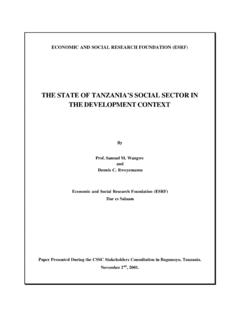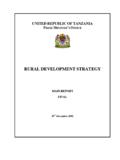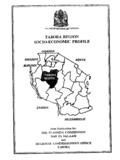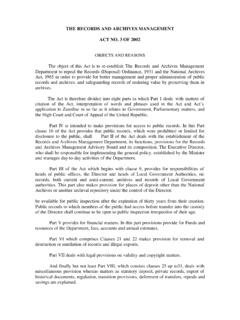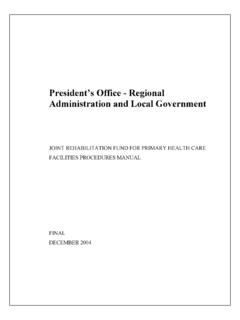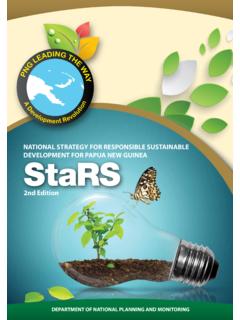Transcription of CONCEPTS AND APPROACHES TO VOCATIONAL …
1 CONCEPTS AND APPROACHES TO VOCATIONAL TRAINING IN THE INFORMAL sector The Tanzanian Case January 2000 Babette Pfander Ewald Gold GTZ/VETA Dar es Salaam Tanzania CONCEPTS and APPROACHES of VOCATIONAL Training in the Informal sector January 2000 i Table of Contents 1. The Framework of the Study and Terms of The Tanzanian The structure of the 2. Relevant Contextual A brief Introduction to Historical General Education in The Education Education VET developments from independence to From independence to The VET Act (1994)..7 Strategic Action Plan I (1996-1999) SAP Strategic Action Plan II (1999-2004) SAP 3. Situation Analysis VET Training Labour Market Donor 4. The Informal Definition of the Informal The Informal sector in Existing Policies with regard to the Informal The Regulatory VETA's Position with Regard to the 5.
2 GTZ/VETA VETA A Changing Environment to Work GTZ Assistance in Tanzania An The GTZ Approach to Employment Modular Training for Target Groups in the Informal Traditional Assessment of GTZ Introductory Overall Appraisal of the GTZ Demand Operational Financial The Report in Graphs Bibliography Appendices 1. Terms of Reference 2. Project Planning Matrix CONCEPTS and APPROACHES of VOCATIONAL Training in the Informal sector January 2000 ii Acknowledgements This report is the result of a review of various reports and other documents as well as of discussions with staff and experts at VETA in Dar es Salaam. The authors are obliged for the assistance and support received during the survey and the compilation of data. In the first place we thank Ms.
3 Bernadetta Ndunguru (Director for VOCATIONAL and Educational Training of VETA) for her assistance in the implementation of the study. Furthermore we are grateful to all discussion partners for their valuable contributions and the time they took for exchanging ideas and information. These are Dr. Susanna Adam, Mr. Dieter Moll (freelance consultants for GTZ), Mr. Lars Hald (Danida Chief Technical Advisor), as well as Mr. Erik Beemsterboer and Ms. Marjolein Groenewegen (Programme Officers ILO). The same amount of gratitude goes to all VETA and GTZ/VETA staff, who supported us while searching for relevant documents and facilitating appointments. Among those are in particular Ms. Daphroser Mkindi and Ms. Rehema Binamungu. Dar es Salaam, January 2000 Babette Pfander Ewald Gold CONCEPTS and APPROACHES of VOCATIONAL Training in the Informal sector January 2000 iii Abbreviations ATE Association of Tanzanian Employers Danida Danish International Development Agency ER Enrolment Rate ERP Economic Recovery Plan ESAP Economic and Social Action Programme GDP Gross Domestic Product GTZ German Agency for Development ILO International Labour Organisation IS Informal sector JICA Japanese International Development Agency MCDWAC Ministry of Community Development.
4 Women Affairs and Children MIT Ministry of Industry and Trade MOEC Ministry of Education and Culture MOLYD Ministry of Labour and Youth Development MSE Micro and Small Enterprise MVTTC Morogoro VOCATIONAL Teachers' Training College NEP National Employment Policy NESP National Economic Survival Plan NVTC National VOCATIONAL Training Council NVTD National VOCATIONAL Training Division OTTU Organisation of Tanzania Trade Unions PTTC Post-primary Technical Training Colleges RVTSC Regional VOCATIONAL Training and Service Centre SAP Strategic Action Plan SIDA Swedish International Development Agency SIDP Sustainable Industrial Development Policy TAC Trade Advisory Committee TFTU Tanzanian Federation of Trade Unions TP Training Provider TSS Technical Secondary School UNIDO United Nations Industrial Development Organisation VET VOCATIONAL Education and Training VETA VOCATIONAL Education and Training Authority VSO British Volunteer Service Overseas VT VOCATIONAL Training VTC VOCATIONAL Training Centre CONCEPTS and APPROACHES of VOCATIONAL Training in the Informal sector January 2000 1 1.
5 Introduction The Framework of the Study and Terms of Reference The following study has been initiated within the framework of a GTZ sector project " CONCEPTS and APPROACHES of VOCATIONAL Training (VT) in the Informal sector ". This project addresses selected GTZ-projects in developing countries, which aim at economic improvement through non-formal and traditional training geared to the informal sector . The project's objective is threefold: 1. Compilation and analysis of the multitude of practical experiences made in the field of VT for the informal sector 2. Extension and support for establishing a forum for the direct exchange of experiences and the dissemination of innovations among the projects involved 3. Offering conceptual services and planning support to other potential training providers in the informal sector for a direct dissemination of innovation As a first step in the procedure as described above, each project is commissioned to compile a report describing and assessing the existing experiences in the national context.
6 The Terms of Reference (see appendix 1) concentrated on the following four areas: 1. The state of affairs with regard to services in the project environment (the country), within which professional, commercial and technical skills are imparted ( training providers, structure and contents of training, socio-economic environment, financial and legal aspects) 2. The entry point and set-up of the GTZ assistance in the respective country ( collaboration with executing and implementing agencies, intermediaries, quality control, financial aspects) 3. The results/ effects of the GTZ assistance ( observable outputs, cost-benefit ratio, replicability, financing) 4. The lessons learnt with regard to GTZ supporting such contributions to VT for the informal sector ( benefit of the GTZ assistance, organisational analysis) The Tanzanian Case VETA ( VOCATIONAL Education and Training Authority) has been established as an independent government agency in 1995.
7 VETA is controlled by a multi-partite National VET Board, consisting of representatives of three government ministries, employers' and employees' organisations, as well as representatives of non-governmental training institutions. The National Board develops policies and supervises their implementation at national level. The National Board elects the Director General. With regard to decentralisation, Regional Boards have been established in ten VETA regions throughout Tanzania. These Boards oversee VET activities at regional level. GTZ started collaborating with its partner VETA in 07/1997 with an open orientation phase until 6/2000. During that first project phase the following results were to be achieved: 1. Development of a Dar es Salaam VOCATIONAL Education and Training (VET) concept regarding social and market demand 2.
8 Development of gender specific proposals on how to integrate non-formal training modes into the VET system 3. Integration of entrepreneurial values and commercial skills in VET programmes in Dar es Salaam Region 4. Improvement of VETA's organisational effectiveness 5. Clarification of terms for the medium-term collaboration between VETA and GTZ CONCEPTS and APPROACHES of VOCATIONAL Training in the Informal sector January 2000 2 By the end of 1997 efforts to support the informal sector within the second component have been undertaken for the first time. VETA up till then mainly concentrated on the formal sector and on standard trades. As the informal sector was relatively unexplored, there was a need for assessing the situation, in order to touch ground with the Tanzanian reality. In 1999 first pilot projects were designed and approved and implementation took place in the second half of 1999.
9 The experiences of GTZ are very recent, and it is because of this that the report will have to be looked at as a baseline assessment of CONCEPTS rather than as a comprehensive evaluation of "hands-on" experiences. The structure of the Report Following these introductory remarks, the second chapter will illustrate the relevant contextual framework. This includes a presentation of the socio-economic history of Tanzania and of the educational system, as well as the historical analysis of the VET system. Chapter 3 focuses on the situation with regard to VET in 1999. Thereby the existing training providers will be introduced and the most prevalent characteristics of the system will be highlighted. This is followed by a short overview over the labour market situation and a sub-chapter on donor support to the VET sector .
10 Chapter 4 is dedicated to a brief analysis of the informal sector in Tanzania. It includes definitions, a presentation of the informal sector in Tanzania, an overview on relevant policy papers, the regulatory environment of the informal sector and the description of VETA's role with regard to the informal sector . In Chapter 5 the focal point is on GTZ's contribution, its institutional environment and the APPROACHES chosen. The discussion of the APPROACHES takes the reader to a preliminary assessment thereof. Chapter 6 summarises the core elements of the main report in graphs (Chart 1-11), which shall illustrate the facts described in the main body of the report. CONCEPTS and APPROACHES of VOCATIONAL Training in the Informal sector January 2000 3 2.
